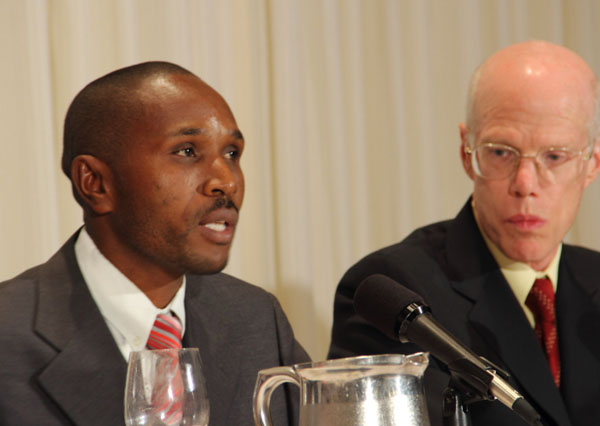
It is no longer a question of should the international community tackle the logistics of cleaning up the supply chain of conflict minerals from eastern Congo, but how to address the crisis through our globalized economy.
A panel of leading policy makers, experts from the private sector, and faith leaders echoed this sentiment during an event last week held at the National Press Club. The Enough Project’s partner organizations Global Witness and the Brookings Institute, facilitated an interactive dialogue among experts on the implications of the current delay by the Securities and Exchange Commission, or SEC, in the release of the conflict-free supply chain regulations required under provision 1502 of the Dodd-Frank Act.
The panel’s moderator, Daniel Kaufmann, a fellow of the Brookings Institute, framed the discussion stating:
While few would publicly argue against promoting transparency generally, it is no secret that these provisions have generated much discussion and controversy. This matters for how the provisions will be implemented in practice. Thus, it is important to seriously debate all sides of the issues surrounding these two provisions, including the criticisms leveled against them.
Discussions on the panel centered on the effects of delaying 1502 regulations on companies and civil society groups in Congo. “It’s important to remember the main objective of the provision, which is to pressure the supply chain to finally create a conflict-free supply chain,” Sandy Merber of General Electric Company reminded the audience. The importance and necessity of the provision was unanimously stressed by all of the panelists, who included Congolese human rights activists and attorney Delly Sesete, Corinna Gilfillan of Global Witness, Mark Taylor of Fafo, Tim Mohin of AMD, and Bruce Calder of Claigan Environmental.
Merber and Gilfillan explained that the 1502 provision is essentially a blunt disclosure statute, requiring due diligence with clear-cut standards. Taylor emphasized that without the release of clear regulations from the SEC, companies will continue to struggle with the actual interpretation of 1502 and continue to individually interpret the law without streamlined international criteria for measuring and assessing their supply chains. The result of this ambiguity is causing major uncertainty in the global market for tin, tungsten, tantalum, and gold.
Mohin and other panelists stressed the necessity, but not the sufficiency, of the proposed regulations. More needs to be done to clean up the supply chain of these minerals to ultimately end the profit of rebel groups controlling the mines in eastern Congo. While awaiting the SEC regulations, companies should be in full compliance with the OECD due diligence guidance developed last year. Companies must not allow the economic cost to overshadow the human cost of the conflict mineral trade that has wrecked communities in Congo.
Representing the Congolese community on the panel, Delly Sesete gave a first-hand account of how the struggle over natural resources is impacting the livelihoods of the Congolese people. The Congolese government’s initial reaction to 1502 has incentivized the withdrawal of military from mining sites with the support of the local U.N. peacekeeping troops. Delly said it is essential to understand the actual working conditions of the miners—referencing the recent Free the Slaves report—because the many miners are children and would be categorized as modern-day slaves. This instability within the mines is also a direct link to the high rates of violence and rape against women used as a weapon of war by the rebel groups who control the mines. Delly called on the SEC to immediately release the 1502 regulations to provide clarity on how the actual guidelines will contribute to cleaning up the supply chain of gold, tin, tantalum, and tungsten.
In addition to the expert panel’s lively discussion, guest speakers such as Representative Jim McDermott (D-WA), Senator Ben Cardin (D-MD), and Reverend Jim Wallis made the moral argument that as consumers of the end-products sourced from minerals of eastern Congo, we are connected to the conflict and violence inflicted on the Congolese people. Rev. Wallis urged for immediate action, stating,
A key to the Congo’s peace and prosperity will be to ensure that American’s aren’t putting money into the hands of violent militias. That the natural wealth that the country has benefits the people who live there. We have a responsibility. We have a job. We can’t just walk on by with our excuses because the people of the Congo are our neighbors.
Photo: Delly Sesete at the National Press Club in Washington, D.C. (Global Witness)

